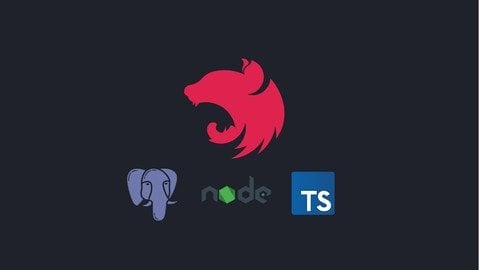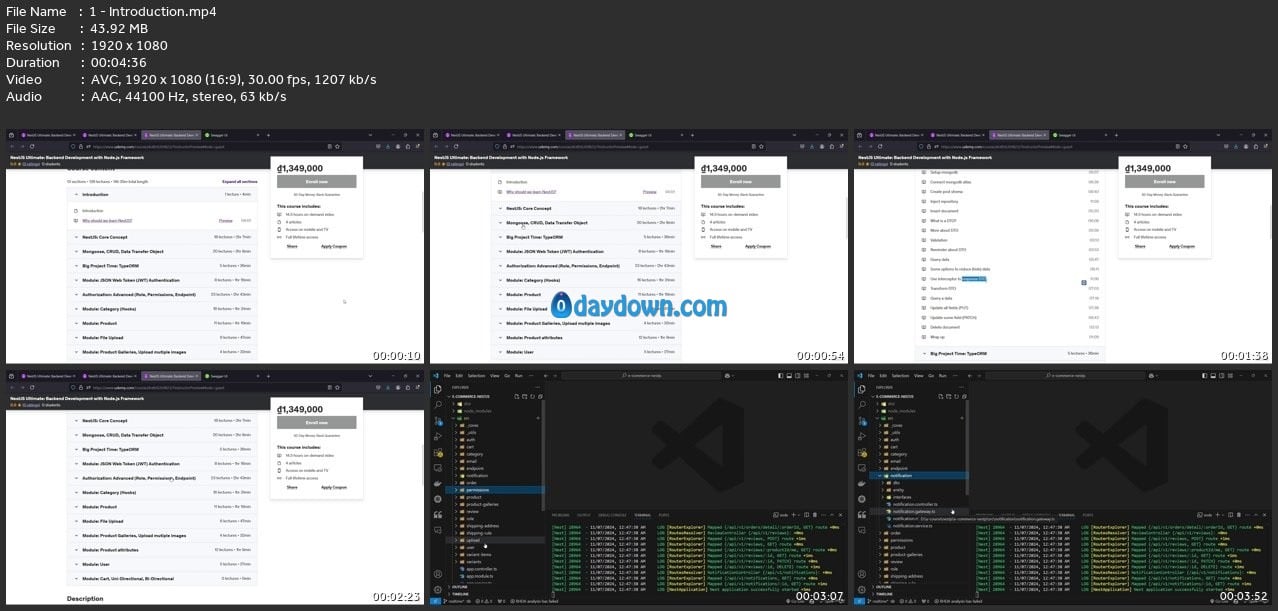
Published 11/2024
MP4 | Video: h264, 1920×1080 | Audio: AAC, 44.1 KHz
Language: English | Size: 12.22 GB | Duration: 16h 6m
Building Scalable Projects with NestJS: WebSockets, Real-Time Notifications, Email Integration, and More
What you’ll learn
Master the core concepts of NestJS and understand its powerful architecture for building scalable applications.
Learn how to set up and configure a NestJS project from scratch using TypeScript, Express, and various key libraries.
Understand database integration using both MongoDB and SQL (via TypeORM), and how to structure your data models effectively.
Build a hands-on project with MongoDB to reinforce your NestJS skills and understand real-world use cases.
Create a large-scale, production-ready application using SQL, TypeORM, and advanced NestJS features like authentication, middleware, and more.
Develop real-time features with WebSockets and integrate them seamlessly into your applications.
Learn to troubleshoot and debug your code effectively, gaining critical skills for fixing issues and improving performance.
Develop a research-oriented mindset to confidently read official documentation and learn new technologies.
Avoid the “tutorial hell” trap by learning how to think independently and solve problems on your own.
Gain a strong foundation in backend development that prepares you to work with any other framework or language in the future.
Requirements
You need to know the basics of typescript
Have knowledge of NodeJS
Understanding of expressJS is recommended but not required
Have knowledge of SQL (basic) skills
Description
NestJS is a powerful and rapidly growing framework that enables developers to build scalable and efficient applications with ease. In this course, you’ll learn how to harness the full potential of NestJS to create robust backend systems.In this course, you’re not just going to learn NestJS; you’ll also master the essential skills of learning new technologies. Forget fancy slideshows and fluff—this course is all about diving deep into the core material, directly from official resources. I believe in the power of real, hands-on learning, and instead of simply repeating what’s already out there, we will focus on practical application.Why do I say “you don’t just learn NestJS”? Because in this course, I’m going to show you how to research, troubleshoot, and read documentation effectively—skills every developer needs to thrive. These aren’t just technical abilities; they are life skills for problem-solving and continuous learning, which are crucial to keep up with ever-evolving technology.Upon completing this course, you won’t just be proficient in NestJS. You’ll have developed the confidence and methodology to pick up any framework, language, or tool you wish to learn. This course will teach you how to avoid the trap of “tutorial hell”—that frustrating cycle where you rely too much on step-by-step guides without gaining true understanding. You’ll learn how to think independently, explore documentation, and solve problems—transforming you into a self-sufficient developer, ready to tackle any challenge that comes your way.What will you learn in this course?Core NestJS Concepts: We’ll start by building a solid foundation of NestJS, diving into the framework’s core features and best practices for building maintainable applications.Building a Small Application with MongoDB: Once you’re familiar with the basics, we’ll work on a hands-on project using MongoDB to help reinforce your understanding of NestJS and how to apply it in real-world scenarios.Developing a Large-Scale Application with SQL and TypeORM: Finally, we’ll scale things up by developing a large and complex application using SQL and TypeORM, integrating advanced concepts like authentication, real-time communication, and more.
Overview
Section 1: Introduction
Lecture 1 Introduction
Lecture 2 Why should we learn NestJS?
Section 2: NestJS: Core Concept
Lecture 3 Explore NestJS folder structure
Lecture 4 Controller in NestJS
Lecture 5 Single responsibility principle
Lecture 6 Introduction to Provider
Lecture 7 Inversion of Control principle
Lecture 8 Apply IoC principle in NestJS
Lecture 9 Dependency Injection
Lecture 10 How IoC Container work?
Lecture 11 Look at Module
Lecture 12 Work with Module
Lecture 13 Middleware
Lecture 14 Middleware – part 2
Lecture 15 Exception
Lecture 16 Pipes
Lecture 17 Guard
Lecture 18 Interceptor
Lecture 19 Custom decorators
Lecture 20 Wrap up: Core concept
Section 3: Mongoose, CRUD, Data Transfer Object
Lecture 21 Section overview
Lecture 22 Nest CLI
Lecture 23 Setup mongodb
Lecture 24 Connect mongodb atlas
Lecture 25 Create post shema
Lecture 26 Inject repository
Lecture 27 Insert document
Lecture 28 What is a DTO?
Lecture 29 More about DTO
Lecture 30 Validation
Lecture 31 Reminder about DTO
Lecture 32 Query data
Lecture 33 Some options to reduce (hide) data
Lecture 34 Use interceptor to response DTO
Lecture 35 Transform DTO
Lecture 36 Query a data
Lecture 37 Update all fields (PUT)
Lecture 38 Update some field (PATCH)
Lecture 39 Delete document
Lecture 40 Wrap up
Section 4: Big Project Time: TypeORM
Lecture 41 Create new NestJS Project
Lecture 42 Setup TypeORM with PostgresQL
Lecture 43 Environment variables
Lecture 44 Create user entity
Lecture 45 Work with TypeORM
Section 5: Module: JSON Web Token (JWT) Authentication
Lecture 46 Create auth module
Lecture 47 Again … Dependency Injection – Sign Up user
Lecture 48 Unique email
Lecture 49 JWT Async configuration
Lecture 50 Sign In
Lecture 51 Refactor JWT Generate
Lecture 52 Authentication Guard
Lecture 53 Get current user
Section 6: Authorization: Advanced (Role, Permissions, Endpoint)
Lecture 54 Create role module
Lecture 55 Many To One Relationship
Lecture 56 Create role
Lecture 57 Create role
Lecture 58 Assign role to user
Lecture 59 Get all roles
Lecture 60 Update role
Lecture 61 Delete role
Lecture 62 TypeORM join table (relation) – prevent delete assigned role
Lecture 63 The idea of permissions
Lecture 64 Create endpoint module
Lecture 65 Endpoint entity
Lecture 66 Create endpoint
Lecture 67 Strategy to handle 1 THOUSAND ENDPOINT – Truncate all endpoint
Lecture 68 How to get all endpoint in application ?
Lecture 69 Insert all endpoint to DB
Lecture 70 Database Transaction
Lecture 71 Permission module
Lecture 72 Permission entity
Lecture 73 Compose primary key
Lecture 74 Add all permissions to DB
Lecture 75 Allow permission
Lecture 76 Authorization has not yet been completed, my friends
Section 7: Module: Category (Hooks)
Lecture 77 Category Entity
Lecture 78 Customhttp status code
Lecture 79 Swagger
Lecture 80 If you want to use swagger
Lecture 81 Create category
Lecture 82 TypeORM hook – Handle slug
Lecture 83 Get category
Lecture 84 Upgrade your response DTO
Lecture 85 Update category
Lecture 86 Delete category
Lecture 87 TypeORM built-in soft delete
Lecture 88 Welcome to child category
Lecture 89 Understand child category
Lecture 90 Create child category
Lecture 91 Nested DTO – Find parent category along with child category
Lecture 92 Fix DTO
Section 8: Module: Product
Lecture 93 Product entity
Lecture 94 Postgres data types
Lecture 95 Explain precision and scale in numeric
Lecture 96 Create product
Lecture 97 Custom property in response DTO
Lecture 98 Get all products
Lecture 99 Get one product
Lecture 100 Update product
Lecture 101 Soft delete product
Lecture 102 Pagination & Filtering
Lecture 103 Product response dto with pagination
Section 9: Module: File Upload
Lecture 104 Upload module
Lecture 105 First look about upload file
Lecture 106 Upload image to disk
Lecture 107 Type upload
Lecture 108 Save image url to DB
Lecture 109 Wrap up
Section 10: Module: Product Galleries, Upload mutiple images
Lecture 110 Product Gallery Module
Lecture 111 First look to upload multiple images
Lecture 112 Upload mutiple images
Lecture 113 Delete gallery and image
Section 11: Module: Product attributes
Lecture 114 The idea of product attributes
Lecture 115 Create Variant entity
Lecture 116 Create variant
Lecture 117 Find variants by product
Lecture 118 Delete variant
Lecture 119 Create variant item entity
Lecture 120 Create variant item
Lecture 121 Find item by variant
Lecture 122 Delete variant item
Lecture 123 What happen If we remove variant ?
Lecture 124 Variant item price
Lecture 125 Introduction to deeply nested DTO
Section 12: Module: User
Lecture 126 Comback to user module
Lecture 127 Get a user
Lecture 128 Update user
Lecture 129 Delete user
Lecture 130 Change password
Lecture 131 Update my information
Section 13: Module: Cart, Uni-Directional, Bi-Directional
Lecture 132 Create cart entity
Lecture 133 Understand uni-directional & bi-directional – cart item entity
Lecture 134 Create cart for user
Lecture 135 Add to cart
Lecture 136 Add variant to cart item
Lecture 137 Add to cart completed
Lecture 138 Delete item from cart
Lecture 139 Get my cart
Beginner or Intermediate Developers who are ready to tackle more complex projects and want to understand how to integrate databases like MongoDB and SQL.,Students looking to improve their problem-solving skills by learning how to research, troubleshoot, and read official documentation.,Developers who want to break free from tutorial hell and become self-sufficient in learning new technologies, frameworks, and languages.,Anyone interested in building large-scale applications and learning how to manage complex architectures and integrations with real-time capabilities.
转载请注明:0daytown » Nestjs Ultimate: Backend Development With Node.Js Framework
